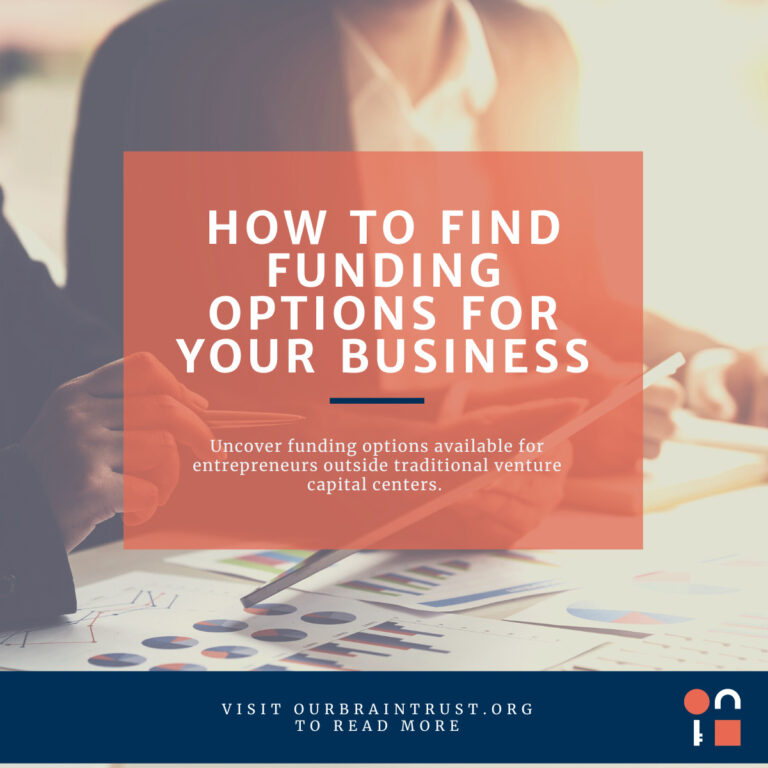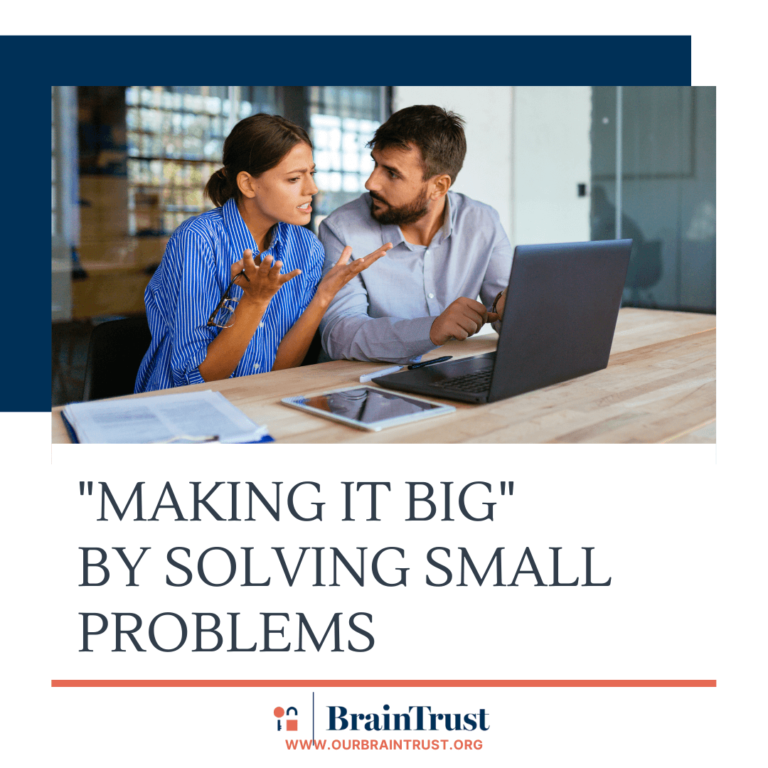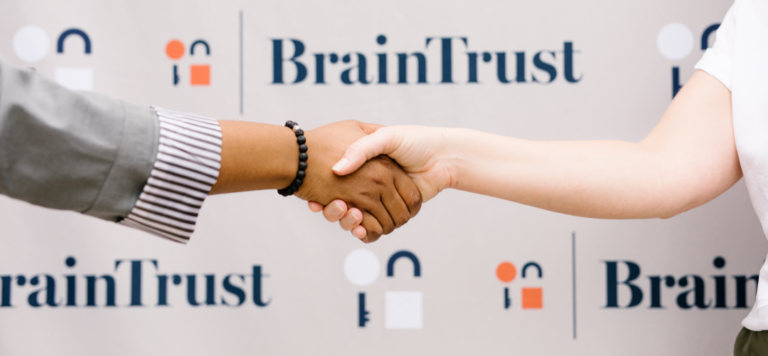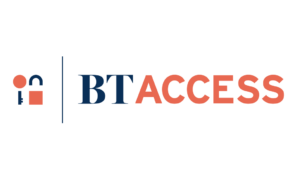LONELY AT THE TOP?
WRITTEN BY SHERRY DEUTSCHMANN
For most of my life, when I heard the phrase “lonely at the top,” I thought of it as a sarcastic remark by someone AT the top, condescending to those they led, pointing out the fact that it was the few, the elite, that made it to the “top” – whatever that was.
Later, as I became an entrepreneur, a CEO, that phrase came to mean something quite different and it began to resonate. I began to see it as a humbler admission, that often, when you’re in the lead, you must fearlessly lead on, even though you are experiencing self-doubt, imposter syndrome, fear, and great anxiety. Here are just a few situations where that feeling of loneliness in my position changed my perception:
- In the early days, when I had a 50/50 founding partner who chose to part ways, leaving me “holding the bag,” I was terribly lonely. If I didn’t have her to talk with, to celebrate adding new clients, or to worry with me about how to bring our IT department in house when our resources were so limited, who could I talk with?
- There was no social life. I was working 70-80 hours a week, and then when I made time for friends, they just couldn’t understand why I’d given up a good-paying job to work out of my basement.
- As the company grew and I took on an investor and appointed a board of directors, I recall feeling so alone, terrified even…walking into a board meeting to explain a setback. (Imagine me in that room with my high school education, sitting across the table from my investor, a man who’d taken 42 companies public…trying to convince him and the others that I was the right person to lead the company!).
I could go on for hours, telling you about crucial times when I needed someone to talk with, but no one was there. Yet, most of those stories were in the early years of the company, not later. Why? For two reasons.
One, I found mentors and coaches to help me along my journey; and more importantly, because I found my “tribe,” a group of other entrepreneurs who understood my predicaments because they’d experienced something similar in their own companies. What a relief! To be able to talk with someone who’d been where I was, who’d either screwed it up badly, or had succeeded beautifully. Both sets of experiences would be so valuable to me!
The two best tribes I joined in my days of running LetterLogic were the Entrepreneurs’ Organization (EO) and the Women Presidents’ Organization (WPO). Both are peer-to-peer memberships, and they operate in much the same way.
At the core of how they work is a monthly small group meeting where each person reports on the most impactful things (business or personal) going on in their lives, and then shares important challenges they are facing. Next, the fellow members ask clarifying questions regarding the challenge you described, ensuring they are getting to the heart of the matter, not just the superficial symptoms of the issue. Finally, instead of giving their advice on such a matter, they share their experiences in dealing with a similar or related problem, allowing you to see the potential outcomes to your actions. Incredibly valuable.
It was so valuable, in fact, that I raved about it all the time and constantly recommended EO and WPO to everyone who qualified. Including my husband, Mark, who joined EO and loved having his own small group – what EO calls a “Forum.”
But, at the time I was members of both organizations, I was also on several boards and had several of my own mentees in addition to leading a fast-growth company. Not coincidentally, my company was experiencing some serious problems and I needed to focus on those. Physically and mentally exhausted, I took a drastic measure and withdrew from everything. I cancelled my memberships and notified the boards on which I served, and just said “sorry, I must focus on my own business and personal health this time.” I determined that as I could, I’d add back only those things that really made a difference. All was well.
And then, one day I found myself at a 500-person luncheon listening to some expert on something, sitting between a banker (on whose board I’d once served) and a friend, a man in my husband’s EO group. Earlier that morning, I’d uncovered one of the biggest challenges in the history of my company – something that felt like a major betrayal coming from one of the most loyal, dedicated members of my executive team.
I was so distracted that I didn’t hear a word the speaker was saying. So, I whispered a goodbye to my banker friend on my left and then to my friend on the right – the man from my husband’s EO group, I whispered: “Hey Darek, I have a crisis at work and I have no business being here right now. I need to go back to the office to try to solve this dilemma now because Mark and I are heading off to Europe tomorrow on vacation.”
Darek whispered back: “Why don’t you call your Forum (EO group) and run this by them?” Yikes! I realized he didn’t know I was an EO dropout! So, quietly I told him I was no longer a member and therefore didn’t have a Forum to call on.
His reaction: “Hold on…I’ll see if my EO group can meet with you instead.” Well, ‘lo and behold, 30 minutes later, the members of his EO Forum had dropped what they were doing and were sitting around a table in my home, eager to help me determine the right path forward. As is the standard protocol, I laid out the problem as best I could and they went ‘round the circle a few times, asking questions to gain clarity. Then, they shared their relevant experiences and VOILA, the decision became clear. I knew what I had to do. And it started with postponing my vacation!
With their wisdom that came from their own experiences, I was able to solve one of the biggest challenges I’d ever faced as a leader. That experience with them taught me that I never wanted to be without my own tribe again, so I rejoined EO immediately.
Here are some reasons why having my own tribe is invaluable to me (and will be to you):
- When you’re at the top of the org chart, who is going to tell you the hard truth and call you out when needed? Even in small companies, politics are always at play and it’s hard to get people to tell you what you don’t want to hear. Or, to tell you when when your ego is out of control or you are being willfully blind.
- If you’re in a partnership and you have a problem your partner, who can you confide in about those issues? If you want to buy them out…who can help you discuss the pros and cons of that path?
- If you’re facing the possibility of a bankruptcy, who would be your sounding board?
- If you’re needing to add several new people in key positions and don’t know what the pay scale and incentive package should be, whose advice would you seek?
- And, perhaps most importantly, if you have ambitious goals for your company, who is going to hold you accountable to meeting those goals?
See what I mean? Often, when you’re at the top, you have no one with whom to hash out all these things. “It’s lonely at the top.” You need company….people who understand and can help you choose the course and hold you accountable for staying true to that path. You need a tribe.
If you are an entrepreneur, owning at least 50% of the business and your annual revenue is more than $1M, I would encourage you to join EO or WPO, or an organization like them today. Though there are other great entities to support entrepreneurs, I especially like these two because of the peer-to-peer learning aspect – hearing from individuals who’ve been in your shoes and whose experience can help you avoid making serious mistakes.
Speaking of mistakes…in the next several blogs, I’ll entertain you with some of my biggest…it’s a long list. But if hearing about my mistakes can help you avoid your own potholes, I’m good with that.
Seeing how valuable EO and WPO were to me, in 2019 I started BrainTrust, a peer-to-peer organization to help women entrepreneurs get to the critical $1Million annual revenue mark. We launched in Nashville and will be expanding to a city near you soon.








